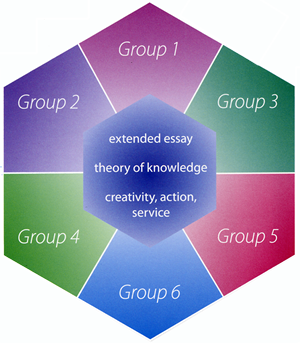|
IB students have not only completed their exams, they have completed a program of education which emphasizes high academic standards, international mindedness and develops learning skills that will last a lifetime.
The breadth and balance of learning is achieved by the course of study required. To earn an IB Diploma, students must take courses in six subjects from the following 6 subject areas. In addition, they are required to complete a course in the Theory of Knowledge, to write an Extended Essay of 4,000 words on a subject of their choice, and to complete a minimum of 150 hours of activities in the areas of Creativity, Action and Service. Central to all subjects are the Extended Essay, Theory of Knowledge (TOK) and Creativity Action & Service (CAS).
Group 1 - Language A
The study of literature, including selected works from World Literature. This is traditionally the student's native language.
Group 2 - Language B
A second modern language, Spanish, French, or Chinese
Group 3 - Individuals and Societies
Economics, Psychology, History
The education of the "whole person" takes on a special significance in the twenty-first century when knowledge continues to expand dramatically; when advanced technologies and global economics have tied together vastly different cultures; when the world is bound too closely for provincial ideologies to guide political thought; when to exist in a world community requires appreciation and understanding of cultural diversity; and when cooperation alone will solve global problems. It is essential that academic training provide students with the values and opportunities that will enable them to succeed in the competitive, modern world.
Group 4 - Experimental Sciences
Biology, Chemistry, Physics
Group 5 - Mathematics
Mathematics HL, Mathematics SL, or Mathematical Studies
Group 6 - The Arts and Electives
Theater, Visual Arts, Music or a second subject from groups 2-4
Theory of Knowledge (TOK)
The study in TOK is central to the educational philosophy of the International Baccalaureate. TOK explores the assumptions and values on which the various subject disciplines are based as well as their limitations. It encourages students (and teachers) to reflect critically on various ways of knowing (experience, reason etc) and areas of knowledge (subject disciplines), and to deliberate on the role that knowledge plays in a larger society. It encourages students to become conscious of themselves as thinkers, to become aware of the complexity and intricacy of knowledge, and to recognize and appreciate the need to act responsibly in an increasingly interconnected world.
As a thoughtful and resolute enquiry into dissimilar ways of knowing, and into diverse kinds of knowledge, the TOK course is compiled more or less entirely of questions. The most essential of these questions is: The teacher involves the application of this central and crucial question to many diverse, yet interrelated, subjects and matters of concern for all human beings.
Extended Essay
This is a substantial piece of independent research (4,000 words) on a topic of the student's choice from a wide range of subject areas and supervised by a member of the school's staff. The emphasis is on original research, careful analysis and academic rigor.
Creativity, Action, Service (CAS)
In order to provide a balance to their academic studies, and to provide for the well rounded development of imaginative, fit and compassionate young people who leave school ready and able to participate in the life of a wider community, students are required to complete a CAS program, including at least fifty hours each of activities classed as Creativity, Action and Service. Activities can often be a combination of Creativity and Service, or Action and Creativity or even of all three. The CAS coordinators can assist students in making choices for CAS activities, and some group CAS activities are planned annually.
|

